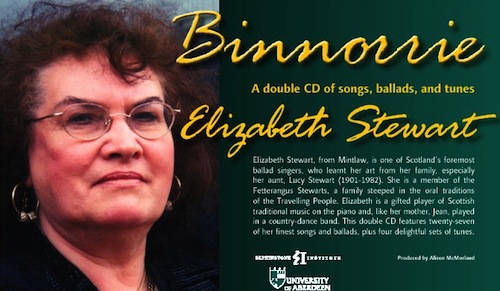8. Elizabeth StewartBinnorie

Elizabeth Stewart is a Scottish traveller singer from Fetterangus in Aberdeenshire and she’s probably one of my favourite living Scottish traditional singers. Her aunt, Lucy Stewart, was recorded in the fifties by an American folklorist called Kenneth Goldstein. It was that age when people like him, Alan Lomax and Hamish Henderson, were collecting music from the people of the world – from the people of Scotland. Elizabeth Stewart learned a lot of her songs from her aunt. I sing, and I’ve recorded, quite a lot of these old ballads that Francis James Child published, these English and Scottish popular ballads. There’s a real detail and subtlety to her singing. Of course, I’m not a traveller, I have an outsider’s appreciation of that culture, but I have a strong love of a lot of the songs and of their singing styles. There’s a lot of different styles within that community, just as there are within any musical or cultural community. I might have chosen something by Jeannie Robertson, another Aberdeenshire singer from the fifties. She was discovered again by Hamish Henderson and she’s regarded as one of the finest Scottish ballad singers of all time. Her daughter, Lizzie Higgins, is another one of my favourite of these Scottish singers. There’s guys like Stanley Robertson, who was also related to Jeannie Robertson, and Sheila Stewart. The Perthshire Stewarts, who were collected in Blairgowrie. The travellers used to go there in the summer to work, to collect the berries. Hamish Henderson said that collecting songs from the travellers in Blairgowrie was like holding a tin can under Niagara Falls, because they had so much material, so many songs and tales.
I’ve studied these Scottish traveller singers by listening to them a lot, and I think those older singing styles have informed my own approach to singing in a way. Not trying to imitate them, because I’m not a traveller and I’m not even a folk revivalist, I’m like a post-post-revivalist if anything. I’m interested in locating my own voice in this continuum of tradition, in a way. A lot of what I listen to now isn’t even recorded albums of music that are commercially available, it’s more like archive recordings of old singers. I listen to a lot of stuff that’s in the School Of Scottish Studies. I’ve done a lot of research at the School Of Scottish Studies, listening to and studying these old singers. Almost like taking an academic approach to it, a research approach to it. It’s more listening than reading. I believe in absorption and osmosis, I don’t get too theoretical about it and I’ve never really had any association with any music academy. That’s one way that I see my own work developing – exploring this traditional form to make something new with it. In some ways I’ve always felt estranged from the world of traditional music, neither in it nor out of it. It’s too folky for the weirdos and too weird for the folkies! The Scottish travellers aren’t Romanies, they aren’t gypsies like the Spanish gypsies are, but if you listen to some of these singers you can maybe hear an affinity with flamenco singers, this more open-throated, quite dramatic, almost operatic style. They’ve got that concept in flamenco of ‘duende’, the spirit of the music. There’s a term ‘coinneadh’, or ‘conyach’, for a similar thing in Scottish traveller singing – it’s hard to define, but I suppose people know it when they hear it. If you were to hear someone sing and they weren’t singing it properly, you’d be like "they’ve not got the conyach!" They’ve not got the spirit, the duende. I always think of those as being equivalent kind of things, this numinous ineffable spirit of the music.


